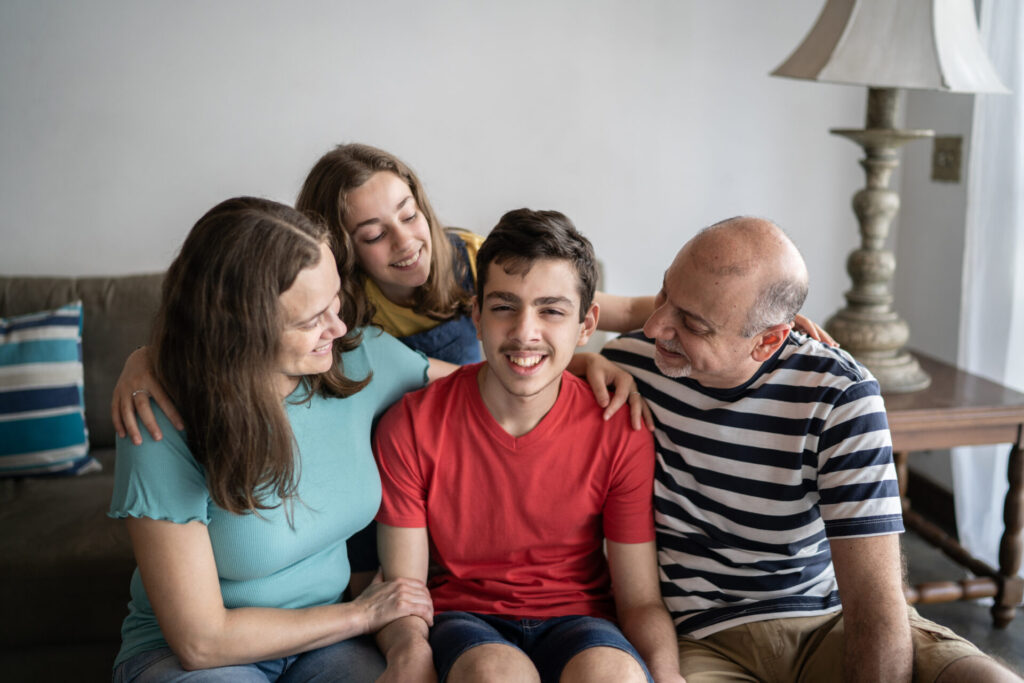Defining Acquired Brain Injury and Its Causes
Acquired brain injury is a broad term that describes brain damage after birth. It can result from various causes, including infection, oxygen deficiency, or a traumatic incident such as a head injury. Two primary categories of ABIs are traumatic brain injury (TBI) and non-traumatic brain injuries (NTBI). TBIs often result from accidents or surgical procedures, while non-traumatic brain injuries can be caused by strokes, brain tumours, or hypoxia.
The symptoms of ABI can vary depending on factors like the type, location and severity. Brain injuries are typically classified as mild, moderate, or severe. Mild acquired brain injury may lead to symptoms such as memory and concentration challenges, dizziness, headaches, and sensitivity to light or sound. Individuals with moderate to severe ABIs may experience confusion, seizures, coordination loss, and mobility difficulties. Individuals may also experience mental health challenges like depression, anxiety, and emotional difficulties.
The diverse causes of ABI highlight the importance of individualised care and support plans tailored to each person’s unique preferences and needs. Understanding ABI’s various causes, symptoms, and effects is crucial for healthcare professionals and caregivers to provide appropriate care, rehabilitation, and support.
The Importance of Rehabilitation
Rehabilitation plays a critical role in the recovery process for individuals with acquired brain injury, helping them to achieve a fulfilling life after the injury. Rehabilitation focuses on equipping individuals with the skills and strategies necessary to adapt to changes resulting from brain injuries. The ultimate goal of rehabilitation is to enable individuals to regain their independence and safely perform daily activities.
Rehabilitation programs are offered in various settings, from inpatient rehabilitation hospitals to outpatient facilities, home-based care, and independent living centres. These settings provide a variety of therapies and support services tailored to individual needs, including:
- Physical therapy
- Occupational therapy
- Psychiatric and psychological care
- Speech and language therapy
- Social support
Recovery following a brain injury is unique for each individual, characterised by gradual progress, with the first six months showing the most visible improvement. While healing may become more evident after a year, psychological recovery can take considerably longer. A personalised rehabilitation program and brain injury support ensure individuals receive the care and support necessary to maximise their independence and well-being.

Challenges Faced by ABI Survivors
Survivors of acquired brain injuries face many challenges impacting their daily lives and overall well-being. These challenges often extend beyond the initial physical recovery phase and include many aspects of cognitive, psychosocial, and emotional functioning.
Some challenges include the following:
- Fatigue: Fatigue can lead to difficulty performing basic daily tasks such as cooking or cleaning and also affects mood, concentration, communication, and engagement in social activities.
- Mobility challenges: Many people face mobility challenges, including reduced movement, balance and coordination difficulties, dizziness, muscle stiffness, and weakness. Some individuals may require mobility aids.
- Sensory challenges: Loss of hearing, vision, taste, smell, or touch can occur due to ABIs. Brain injuries can also affect bodily functions such as temperature regulation, swallowing, bowel and bladder control, sleep, and heart rate regulation.
- Memory challenges: Short-term memory challenges are common after mild to moderate ABIs, affecting remembering recent events and learning new information. Severe ABIs may cause long-term memory challenges.
- Concentration challenges: Focusing on tasks for extended periods may be difficult for people with an ABI, as well as paying attention to multiple things simultaneously or avoiding distractions.
- Executive functioning: Difficulties with executive functioning can impact planning, problem-solving, decision-making, impulse control, and motivation. Reduced judgement and self-awareness may also be present.
- Emotional challenges: Mood swings, depression, anger, sadness, and anxiety can result from both brain injury and the psychological impact of the injury. Individuals may also experience grief, contributing to feelings of hopelessness or self-blame.
- Psychosocial challenges: Difficulty with social interactions, sensitivity to others, and social isolation can affect individuals’ reintegration into their communities and relationships.
- Communication: Speech difficulties can impact communication, as well as cognitive difficulties such as finding the right words.
It’s essential to recognise that the impact of ABI varies from person to person, and individuals may face a combination of these challenges to varying degrees. Rehabilitation and ongoing support are crucial in helping ABI survivors regain independence and improve their overall quality of life.
Home-Based Rehabilitation and Care
Many individuals and their families prefer to receive care and support within the comfort and familiarity of their own homes. Home-based rehabilitation and care offer a unique opportunity for individuals to maintain their independence. With the support of skilled and compassionate caregivers, individuals can continue to live on their terms while benefiting from one-on-one attention and personalised care to manage their physical and mental health.
This form of care involves an intensive approach, focusing on assessment and therapy to reduce the need for prolonged care arrangements or hospital readmission. The emphasis here is on empowering people to do as much as possible with the appropriate support. Therefore, this comprehensive approach to care involves collaboration with a multidisciplinary team of healthcare professionals, including physiotherapists, occupational therapists, and speech and language therapists, to address the complex needs of ABI survivors.
Additionally, caregivers are equipped to monitor and address emotional challenges, promoting a positive mood and self-esteem while identifying and managing symptoms early to ensure well-being. Caregivers can also adapt their approach to evolving needs, ensuring that every individual receives high-quality and person-centred care while maintaining their independence and dignity.
Benefits of Home Care for ABI
The benefits of home care extend beyond physical assistance, caregivers contribute to the overall well-being and safety of individuals.
Home care services provide various benefits for daily living, including:
- Meal preparation
- Companionship
- Housekeeping
- Laundry
- Personal care
- Mobility assistance
- Medication management and medical supervision
Caregivers also support family members with responsibilities, providing peace of mind.

Components of Home-Based Rehabilitation
Home-based rehabilitation programs offer a valuable alternative to traditional hospital-based therapies, providing various benefits while addressing the limitations associated with hospital care. These programs centre around an individual’s daily activities and have a primary objective to promote independence, reduce medication dependency, minimise hospitalisations, and provide vital support to individuals and their caregivers.
These programs include various components, including initial assessments, continuous monitoring, and periodic reassessment of individuals’ progress. They emphasise health promotion and self-care, empowering individuals to take control of their well-being. Personal care, household assistance, and community-based rehabilitation are crucial in helping individuals regain their autonomy. Home-based rehabilitation offers specialised support for individuals with mental health challenges, effectively manages pain and symptoms, and prioritises emotional support, social interaction, and productive activities.
Physical Therapy
Physical therapy, facilitated by skilled physiotherapists (PTs), is vital in rehabilitating individuals with acquired brain injuries. These professionals focus on assessing and addressing limitations in movement and function to promote mobility, reduce pain, restore function, and prevent further difficulties. PTs aim to empower individuals to engage in life at their highest potential. This may involve exercises to improve strength, balance, mobility, range of motion, and stability. Additionally, PTs assist individuals in learning to use adaptive devices like walkers or wheelchairs, ensuring they are correctly adjusted.
Occupational Therapy
Occupational therapy, led by dedicated occupational therapists (OTs), is also vital in the rehabilitation journey. OTs possess a unique skill set that allows them to help individuals regain basic life skills. Occupational therapists primarily focus on activities of daily living, assisting individuals in restoring and improving the performance of fundamental care tasks such as dressing, grooming, bathing, toileting, cooking, housekeeping, and home management. They work conscientiously to improve strength, coordination, and balance, ensuring individuals are equipped for daily routines. Also, OTs assess safety requirements and medical equipment needs to support the individuals’ safe functioning within their home environment.
Speech Therapy
Speech therapy includes a wide range of strategies and interventions tailored to the unique needs of ABI survivors. Speech and language therapists possess specific knowledge and skills related to communication, oral motor function, and swallowing difficulties, ensuring individuals can safely eat and drink. They work conscientiously to help individuals improve their communication abilities, facilitating interactions with family members and caregivers.
Cognitive Therapy
Cognitive-behavioural therapy (CBT) is a highly effective approach for helping individuals with emotional and behavioural challenges. This therapeutic method focuses on addressing the root causes of symptoms and identifying thinking patterns that may contribute to emotional distress. Through CBT, individuals learn valuable skills for emotional regulation and healthy coping mechanisms, which can be especially beneficial for individuals who have developed mental health challenges due to their injuries. Common mental health challenges include depression, anxiety, mood swings, and difficulty with social interactions. CBT provides a valuable framework for addressing these challenges, enabling individuals to manage their emotional well-being better and improve their overall outcomes.
Emotional Support
Emotional changes and difficulties following a brain injury are a common and challenging aspect of the rehabilitation process. Sometimes, additional support and strategies are needed to navigate these challenges effectively.
Individuals are uniquely paired with caregivers, fostering a strong and comfortable relationship and ensuring the best possible match.
Personal management strategies can be instrumental in helping survivors with emotional difficulties. Establishing a daily routine can provide a sense of predictability and calm in times of uncertainty. It’s important to tailor this routine to one’s strengths and areas of improvement, incorporating activities that bring a sense of purpose. Taking breaks when feeling overwhelmed or emotional is essential. Additionally, paying attention to lifestyle factors, such as diet, fresh air, and physical activity, can significantly impact one’s emotional well-being.
Social support is another crucial component of emotional healing. Creating a support network, which may include close friends, loved ones, clinicians, therapists, or other trusted professionals, can provide a vital source of strength during challenging times. Joining a support group, in-person or virtually, can help with isolation, often accompanying rehabilitation.
The Role of Caregivers
Caregivers play a vital role in supporting individuals with acquired brain injuries during rehabilitation and recovery. Individuals are uniquely paired with caregivers, fostering a strong and comfortable relationship and ensuring the best possible match. These caregivers typically have significant experience in personal care, demonstrate a compassionate and caring nature, and exhibit strong organisational skills. They also maintain flexibility in their approach, prioritise the needs of the individuals, and possess excellent communication skills. Caregivers foster warm and friendly relationships with family and friends throughout the care plan, and by providing care in the comfort of the individual’s home, they offer personalised support that promotes a sense of familiarity and comfort during rehabilitation.
Find ABI Caregiver with Nurseline Community Services
At Nurseline Community Services, we understand the unique challenges individuals living with acquired brain injuries face. We are committed to providing tailored care and support to assist their rehabilitation. Our person-centred support plans are aligned with the individual’s specific needs and goals and help individuals stay in the familiarity and comfort of their homes.
Our experienced clinicians work collaboratively with the individual, healthcare teams, case managers, and families to comprehensively understand the individuals’ unique needs and preferences.
Nurseline Community Services is regulated by the Care Quality Commission (CQC) and provides dedicated, nurse-led care.
If you’re seeking compassionate and expert ABI care, contact our team or visit our Gloucester, Bristol, and Birmingham offices to discover how we can positively impact your rehabilitation journey.





